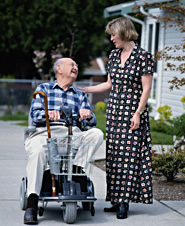|
|
An Update on Americans and Retirement
By Linda Stern, Reuters
April 11, 2004

Americans continue to be unrealistically unprepared for retirement. They think they will work longer, earn more and spend less as they move into their 60s and beyond, a new survey says.
"Worker confidence in having enough money to retire comfortably seems to remain unrelated to whatever economic conditions exist," said Dallas Salisbury, president of the Employee Benefits Research Institute (EBRI), which released the Retirement Confidence Survey. "America appears to be a nation of optimists when it comes to retirement."
It's hard to be all that pessimistic, though, when most of the scare-stirring reports like this one come funded by industry groups and companies that stand to gain from increases in private retirement savings.
Most working Americans also see their parents and older friends and neighbors retiring on far less than most industry experts tell them they will need. Furthermore, many workers may not be as optimistic as Salisbury thinks they are; perhaps they are just stretched too thin by stagnant salaries and the demands of growing kids to set aside much for retirement.
But, a little over-preparation never hurt anyone. If EBRI is right, most workers should be really pumping up their savings. If alarmist surveys like this one turn out to be wrong, then those people who saved too much for retirement will just end up with too much money. Oh, well.
Even if you dismiss the industry's penchant for pessimism, it's likely that many retirement budgets will be strained, and many retirees will be taken by surprise by the reality of their situations. The EBRI survey reported that 32 percent of people over the age of 55 think they will work until they are at least 66, or possibly never retire at all. But in every generation, employers have a way of dumping some 50-somethings overboard, and a substantial number of them never do find other jobs.
Health-care expenses are a huge threat to retirees, but more than a third of workers between the ages of 45 and 54 are expecting their employers to provide retiree health-care benefits. That's highly unlikely to happen; the last generation that thought it had health benefits has found itself busy with class-action lawsuits instead, trying to force their old companies to come through with the programs they promised but failed to deliver.
It's best to avoid the urge to panic. But, do pay some attention to the industry warnings.
Here's what to do now so that you can afford a real retirement when the time comes.
-- Look for a health-care savings account. These accounts are new this year and it will probably be closer to year-end before there are many choices available to consumers. But they afford savers the ability to stash away money for medical expenses that will never be taxable, as long as the money is used for health care. Medicare is in worse shape than Social Security right now; money put aside for medical use that is tax-free forever is a good deal.
-- Feed a Roth IRA. It's true that you don't get an immediate tax break for funding a Roth IRA, but the money earned in the account is also tax-free forever. It is also less locked up than other retirement money; you can usually get to your principal if you need it for college tuition or unexpected emergency expenses.
-- Love your home. It will support you in your old age. The EBRI study, and most other retirement projections ignore the value of home equity, because they operate on the theory that "you've gotta live somewhere."
But most retirees do cash out of their homes at some point. They find the equity they've built up in years of living in and tending a house is substantial. Those who aren't ready to move can often get money from a home-equity line or reverse mortgage. Smart money that you put into maintaining or fixing up a house will often come back to you when you sell.
-- Save early; save often. The best way to fund a comfortable retirement is to start saving early. If you want $1 million in 16 years, you've got to save $2,500 a month and earn 8 percent to do it. Start when you're 25, instead, and you can accumulate that million by the time you're 66 by saving less than $300 a month.
-- Be creative. Think of back-up plans for saving and earning money in retirement. Your boss may not want you around when you're 70, but you still might be able to consult, work part time, or earn money around the edges -- selling on eBay, for example. If a couple can cut back to one car; move to a smaller home or a lower-tax locale and use their retirement time to go to a library instead of a book store, barter instead of buy, and maintain their own house and yard instead of hiring help, they might be able to stretch those inadequate savings.
|
|



